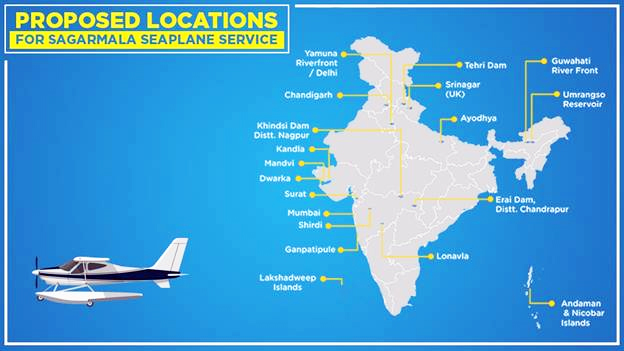Sagarmala Seaplane Services | 05 Jan 2021
Why in News
The Ministry of Ports, Shipping and Waterways is starting the ambitious Project of Sagarmala Seaplane Services (SSPS) with potential airline operators.
- A seaplane is a fixed-wing aeroplane designed for taking off and landing on water.
Key Points
- Mechanism:
- The project is being initiated under a Special Purpose Vehicle (SPV) framework through prospective airline operators.
- SPV is a legal object formed for a specifically-defined singular purpose.
- Project Implementation:
- The project execution and implementation would be through Sagarmala Development Company Ltd (SDCL), which is under the administrative control of the Ministry of Ports, Shipping and Waterways.
- Airline operators will be invited to form a SPV with SDCL.
- The routes may be operated under the government’s subsidised ude desh ka aam nagrik (UDAN) scheme.
- Location: Several destinations are envisaged for seaplane operations:
- Benefits and Significance:
- The seaplanes services will be a game-changer providing a supplementary means of faster and comfortable transportation across the nation.
- Apart from providing air connectivity to various remote religious/tourist places, it will boost tourism for domestic and international holiday makers.
- It will save travel time and stimulate localized short distance travelling especially in the hilly regions or across the rivers/lakes etc.
- It will provide infrastructure enhancements at the places of operations.
- It will generate employment opportunities.
- Previous Project:
- One such Seaplane Service is already in operation between Kevadia and Sabarmati Riverfront in Ahmedabad which was inaugurated in October 2020.
Sagarmala Programme
- The Sagarmala Programme was approved by the Union Cabinet in 2015 which aims at holistic port infrastructure development along the 7,516-km long coastline through modernisation, mechanisation and computerisation.
- Under this port-led development framework, the government hopes to increase its cargo traffic three-fold.
- It also includes the establishment of rail/road linkages with the port terminals, thus providing last-mile connectivity to ports; development of linkages with new regions, enhanced multi-modal connectivity including rail, inland water, coastal and road services.

